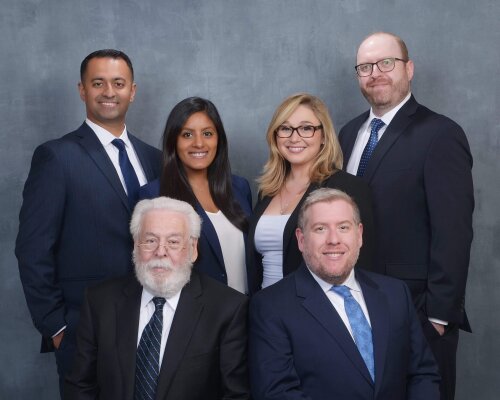Best Motor Vehicle Defect Lawyers in Philadelphia
Share your needs with us, get contacted by law firms.
Free. Takes 2 min.
List of the best lawyers in Philadelphia, United States
About Motor Vehicle Defect Law in Philadelphia, United States
Motor vehicle defect law covers legal claims related to dangerous or malfunctioning vehicles and vehicle parts that cause injury, death, or property damage. In Philadelphia, as elsewhere in Pennsylvania, these claims can arise from defective design, faulty manufacturing, inadequate warnings, improper maintenance, or negligent repairs. A claim can involve the vehicle manufacturer, a parts supplier, a dealer, a repair shop, or others in the chain of commerce. Cases often blend state product liability principles with auto tort law and may also involve federal safety standards, recalls, and warranty laws. The goal of a defect claim is usually to recover compensation for medical bills, lost wages, pain and suffering, property damage, and other losses tied to the defect and the harm it caused.
Why You May Need a Lawyer
Motor vehicle defect cases can be legally and technically complex. You may want a lawyer when:
- You or a loved one was injured or killed and the injury appears linked to a mechanical failure or defective part.
- The cause of a crash is unclear and you need investigation to determine whether a defect played a role.
- The manufacturer denies responsibility, blames user error, or cites improper maintenance or modifications.
- Multiple parties may share responsibility, including parts suppliers, aftermarket installers, or repair shops.
- You are facing an insurance company that minimizes or delays payment, or a manufacturer offering an unsatisfactory settlement.
- You need to preserve critical evidence such as the vehicle, electronic data recorder information, or service records.
- The case involves federal safety standards, recalls, or warranty claims that require specialized knowledge.
An experienced lawyer can evaluate whether you have a viable claim, coordinate investigations with engineers and accident reconstructionists, preserve evidence, negotiate with insurers and manufacturers, and pursue court action when needed.
Local Laws Overview
Key legal aspects relevant to motor vehicle defect claims in Philadelphia and Pennsylvania include:
- Legal theories. Plaintiffs commonly pursue claims under negligence, strict products liability, and breach of warranty. Pennsylvania courts allow claims for manufacturing defects, design defects, and failure to warn. State law and case law define the elements you must prove for each theory.
- Statute of limitations. For personal injury and wrongful death claims in Pennsylvania, the general time limit to file a lawsuit is two years from the date of the injury or death. This deadline is important and missing it can bar recovery unless a narrow exception applies.
- Comparative fault. Pennsylvania applies a modified comparative negligence rule. If a plaintiff is 51 percent or more at fault for their own injury, they generally cannot recover. If the plaintiff is less than 51 percent at fault, recovery is reduced in proportion to their share of fault.
- Evidence preservation. Pennsylvania courts take spoliation seriously. You should preserve the vehicle, parts, and maintenance records as soon as possible. Failure to preserve critical evidence may hurt your case.
- Warranties and Lemon Law. New vehicles are protected by express warranties and by Pennsylvania consumer protection provisions often called Lemon Law. These remedies may offer repair, replacement, or refund options when a new vehicle has persistent, significant defects covered by warranty. Warranty remedies are separate from tort claims but can be pursued alongside them in some circumstances.
- Recalls and federal standards. Federal safety standards and NHTSA recall processes can be relevant. A recall may show that a manufacturer knew of a safety problem, but a recall alone does not automatically guarantee a civil recovery. Federal law may also affect evidence and discovery in a case.
- Who can be sued. Plaintiffs can sue manufacturers, parts suppliers, distributors, retailers, repair shops, and possibly companies that performed modifications or maintenance that contributed to the defect. Identifying responsible parties quickly is critical.
Frequently Asked Questions
How long do I have to file a lawsuit for injuries caused by a vehicle defect?
In Pennsylvania the usual deadline for personal injury or wrongful death lawsuits is two years from the date of the injury or death. This is known as the statute of limitations. There are limited exceptions that can affect the deadline, so it is important to consult a lawyer promptly to protect your rights.
Who can I sue if a defective part caused my crash?
You may be able to sue the vehicle manufacturer, the maker of the defective component, the distributor, the dealer, or a repair shop that performed faulty work. Liability can be shared among multiple parties. A lawyer and technical experts can help identify which entities to name as defendants.
What types of legal claims are available in defect cases?
Common legal theories include negligence, strict products liability, breach of express warranty, and breach of implied warranty. Claims may allege a design defect, a manufacturing defect, or a failure to warn about known risks. Each theory has different legal elements and evidence requirements.
What evidence is most important in a motor vehicle defect case?
Important evidence includes the vehicle and damaged parts, photographs of the scene and damage, maintenance and repair records, the police report, witness statements, the vehicle owner s manual, warranty paperwork, recall notices, and any available electronic data recorder information. Expert testimony from engineers and accident reconstruction specialists is often essential to link the defect to the injury.
What if the vehicle was modified or poorly maintained?
Modifications or poor maintenance can complicate a defect claim because a manufacturer may argue that such factors were the real cause of the problem. However, modifications or maintenance issues do not automatically bar recovery. A careful investigation can determine whether the defect would have caused the harm even without modifications or whether a third party bears responsibility.
Does a manufacturer recall mean I automatically win a lawsuit?
No. A recall can be strong evidence that a problem existed and that the manufacturer was aware of safety issues, but you still must prove that the defect caused your specific injury and quantify your damages. Recalls may strengthen your case and aid discovery, but they do not guarantee a verdict in your favor.
How much does a defect lawyer cost?
Many personal injury and products liability lawyers handle cases on a contingency-fee basis, meaning they get paid only if they recover money for you. The contingency fee is usually a percentage of the recovery. You should ask about fee percentages, how expenses are handled, and whether there are any costs you might owe if you do not win.
How long will my case take?
There is no set timeline. Some cases settle in months, while others take several years, especially when complex engineering issues or multiple defendants are involved. The timeline depends on the extent of injuries, the need for expert analysis, discovery disputes, and settlement negotiations or trial scheduling.
Should I give a recorded statement to the manufacturer or insurer?
You should be cautious. Insurers and manufacturers may seek recorded statements early to obtain admissions or reduce exposure. It is generally wise to consult with an attorney before providing a formal recorded statement. You should always be honest, but you do not have to answer detailed questions without legal advice.
Can I pursue warranty remedies and a defect lawsuit at the same time?
Often yes. Warranty claims and product liability claims are separate legal tracks. You can pursue remedies under warranty or Lemon Law while also preserving the right to pursue a tort claim for personal injury. A lawyer can help coordinate both approaches and advise on strategy.
Additional Resources
When researching or pursuing a motor vehicle defect claim in Philadelphia consider the following resources and organizations for information and assistance:
- Pennsylvania Department of Transportation - for registration, vehicle records, and safety-related information.
- Pennsylvania Attorney General - Bureau of Consumer Protection - for consumer complaints and guidance on vehicle and warranty disputes.
- National Highway Traffic Safety Administration - for recall information, defect investigations, and safety standards.
- Philadelphia Court of Common Pleas - for information about filing civil cases at the county level.
- Philadelphia Bar Association Lawyer Referral Service - to find local attorneys who handle product liability and vehicle defect cases.
- Local legal aid and victim advocacy groups - for guidance when you face financial or support needs after an injury.
- Independent technical experts and industry trade groups - for engineering analysis and technical context during an investigation.
Next Steps
If you believe a motor vehicle defect caused your injury, take the following practical steps promptly:
- Seek medical attention immediately and follow medical advice. Medical records are critical evidence for damages.
- Preserve the vehicle and any parts that failed. If the vehicle must be moved for safety, photograph its condition first and request that the tow company preserve the vehicle for inspection.
- Gather and secure records: repair and maintenance history, warranty paperwork, purchase or lease documents, insurance information, police reports, photos and videos, and names and contact information for witnesses.
- Do not admit fault or speculate about what happened. Short, factual statements are appropriate at the scene, but avoid detailed explanations without legal advice.
- Document expenses and lost income related to the injury, and keep a record of your pain, limitations, and recovery process.
- Contact a qualified motor vehicle defect or products liability attorney as soon as possible. Ask about experience with auto defect cases, use of experts, fee structure, and case strategy. A lawyer can send preservation letters, arrange inspections, help obtain data from the vehicle s electronic systems, and take steps to protect your legal rights before evidence is lost or deadlines pass.
- Consider filing complaints with the appropriate consumer protection agencies and notifying the manufacturer about the problem, but consult your lawyer before agreeing to repairs that might destroy evidence or before giving recorded statements.
Acting quickly to preserve evidence and obtain legal advice will give you the best chance to build a strong case and recover fair compensation if a vehicle defect caused your harm.
Lawzana helps you find the best lawyers and law firms in Philadelphia through a curated and pre-screened list of qualified legal professionals. Our platform offers rankings and detailed profiles of attorneys and law firms, allowing you to compare based on practice areas, including Motor Vehicle Defect, experience, and client feedback.
Each profile includes a description of the firm's areas of practice, client reviews, team members and partners, year of establishment, spoken languages, office locations, contact information, social media presence, and any published articles or resources. Most firms on our platform speak English and are experienced in both local and international legal matters.
Get a quote from top-rated law firms in Philadelphia, United States — quickly, securely, and without unnecessary hassle.
Disclaimer:
The information provided on this page is for general informational purposes only and does not constitute legal advice. While we strive to ensure the accuracy and relevance of the content, legal information may change over time, and interpretations of the law can vary. You should always consult with a qualified legal professional for advice specific to your situation.
We disclaim all liability for actions taken or not taken based on the content of this page. If you believe any information is incorrect or outdated, please contact us, and we will review and update it where appropriate.












